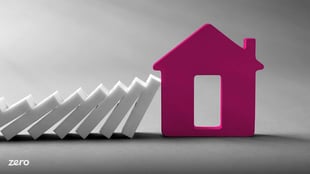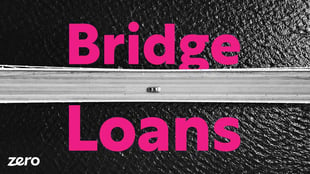What Are Mortgage Loans and How Do They Work?

For many people, owning a home is part of the American dream. To make this dream a reality, most people will take out a mortgage loan to help them finance the cost of purchasing a home. If you are interested in buying a home, but unsure of how a loan or mortgage works, this article is perfect for you.
Read our blog that covers the full homebuying process here.The Basics Of A Mortgage Loan
For most folks, purchasing a home is the single biggest financial decision they’ll ever make in their life. It’s in your best interest to fully understand exactly what you’re getting involved with.
What Exactly Is a Mortgage Loan?
Simply put, a mortgage loan is used to either purchase or refinance a home or property. Purchasing a home can be expensive. Although someone can purchase their home with a lump sum of cash, that isn’t as common.
With a mortgage loan, purchasing a home becomes more achievable because the lender will give a borrower money to buy the home. In return, the borrower pays the lender back over a specific period of time.
Ultimately, the property you buy is the collateral for the loan you receive to buy it.
The Difference Between a Loan and a Mortgage
When it comes to a mortgage loan, it’s actually quite different from a regular loan. Personal loans from your local bank or credit union can be used for anything. One may use a personal loan to buy a car, pay for education, or consolidate credit card debt.
A mortgage loan is strictly used to purchase or refinance a property. Generally speaking, the interest rate on mortgages is lower than the interest rate on personal loans, and the repayment period is also longer.
How Does a Mortgage Loan Work?
A mortgage loan may seem complex because there are a lot of terms and definitions you may not be familiar with. But once you start peeling back the layers, it’s a lot easier to understand what these loans are all about.
The Simple Overview
On a high level, there are a few steps involved with obtaining a mortgage.
First and foremost, the party looking to purchase a property may need to get prequalified for a mortgage loan. The pre-qualification process will be conducted by the lender, and they may do a deep dive into your finances, debt-to-income ratios, and income.
Once you are prequalified for a loan, we suggest you work with a licensed real estate agent to help you find the right home, at the right price. It’s true, you don’t need to be prequalified for a loan to work with a realtor, but it’s in your best interest to be prequalified. Therefore you and the realtor understand what the appropriate budget is, and limit your home search to homes that are within your budget.
After you find the property you’d like to call home, you submit an offer to the seller. If the seller accepts the offer, you’ll move onto the inspection and home appraisal. The inspection is designed to identify anything that’s wrong with the home, and the home appraisal is designed to put a fair value on the property.
If everything checks out good on both the inspection and the appraisal, you’ll begin the closing process. The lender will do one last financial check before approving the mortgage loan. If you pass their final inspection, you’ll receive the clear to close
The Two Parties Involved in a Mortgage
Every mortgage loan transaction will always involve two parties, the lender and the borrower.
Lender
The lender is either a bank, credit union, or online lending service. When you apply for a mortgage loan, the lender will determine if you qualify, and if so, how much you qualify for. Various lenders offer a variety of mortgage options.
Be sure to find a lender that not only provides great customer service, but also provides the mortgage loan package and rates best suited for you.
Borrower
The borrower is the party that is seeking money to purchase a property. A borrower may be; an individual, a married couple, a friend, or even two colleagues.
Mortgage Loan Terminology
The mortgage industry is filled with various terminology and acronyms. We’ll cover the most common ones below.
Amortization
There are two main components to every mortgage; the principal balance and the interest expense. Amortization outlines how these expenses are divided over the lifetime of the loan. In the early years of your loan, most of your monthly payment will go to the interest expense. As you progress through the years, the interest expense makes up a smaller percentage of the overall payment, and more money is being allocated to paying off the principal balance.
Down Payment
The down payment is simply how much money the borrower puts down on the loan, expressed as a percentage of the total loan value. Considering each home and loan has a different price, there is not a fixed dollar amount that is considered an acceptable down payment.
Some loans require a down payment of 3.5%, others require a downpayment of 20%. There are few mortgage loan options that do not require a down payment, such as a VA loan.
If you are purchasing a home for $300,000 and the down payment requirement is 20%, you must be prepared to put $60,000 in cash down. If the down payment requirement is 3.5%, you’ll only be required to put down $10,500.
The size of the down payment can influence your interest expense, and if you have to carry mortgage insurance, which we will cover in greater detail below
Escrow
An escrow account is typically managed by your servicer. This account is used to pay your property tax and even your homeowners insurance. Instead of being responsible to pay these bills individually throughout the year, the mortgage loan lender will add these expenses to your monthly mortgage bill.
The lender will collect this money each month, and pay the insurance and property tax expense at the appropriate time.
Interest Rate
The interest rate is what the lender charges for borrowing their money. Interest rates can be either fixed - meaning they do not change over the life of the mortgage loan, or variable - meaning they adjust up or down over the course of the loan.
Interest rates can be a large expense throughout the lifetime of each loan. Don’t be mistaken, a small difference on the interest rate can add up to a large expense or savings over the lifetime of the loan.
Various macroeconomic and microeconomic factors will impact interest rates. Each lender may have a slightly different interest rate, so be sure to find a lender who is offering a competitive package. Your personal financial situation will also impact your interest rate. If you have a great credit score, expect a more desirable rate. If you have a poor credit score, or a high debt-to-income ratio, your interest rate may be higher
Do you know what the differences between interest rate and APR are? Find out here.
Loan Servicer
Your loan servicer is the company that’s responsible for your monthly mortgage loan. They will process your payments and manage your escrow account. You can also contact your loan servicer for various customer service related questions or concerns.
Loan Types
There are different types of loans in the marketplace, each of them serving a unique purpose and each of them have their own eligibility requirements.
FHA Loans
FHA loans are a popular option for many first time home buyers. What is an FHA loan? Simply put, an FHA loan is a loan that is issued by the Federal Housing Administration. These loans are fully backed and insured by the government, which makes lenders interested in this option as it drastically reduces their risk profile.
Borrowers are able to finance 96.5% of the loan's value, meaning they only need to make a down payment of 3.5%. FHA loans have more lenient credit requirements and are geared to individuals first starting out, or individuals with low-to-moderate income levels.
USDA Loans
The US Department of Agriculture, USDA, also issues mortgage loans. These loans are only eligible to individuals living in certain areas of the United States - typically rural or remote areas. These loans are attractive for the borrower because there is no down payment requirement, and the mortgage loan insurance is less than what someone with an FHA loan would have to pay.
The borrower will have to meet various financial requirements before qualifying for this loan, and one can only qualify if the property they are buying is their primary residence.
VA Loans
The Department of Veteran Affairs also has attractive mortgage loan options. A VA loan is for active-duty service members, eligible spouses of a veteran, or a veteran of the United States Armed Services. VA loans have a long list of benefits, but at the top, most people enjoy the zero down payment requirement and lower credit score approval.
Conventional Loans
A conventional mortgage loan is not backed by any government agency. Rather, conventional loans are issued by private lenders. Considering the lender assumes all the risk of default on these loans, the qualification requirements are more strict. Borrowers will have to have a healthier credit score, and will be required to put down a greater down payment to qualify for these loans.
Making Payments
Now that we’ve discussed the various types of loans, let’s review what the monthly payment is made up of.
Principal
First and foremost, the borrower will be required to pay the principal balance back to the lender. The principal balance is simply the amount of money that was borrowed. If after your down payment, you borrowed $300,000 for your home mortgage loan, that $300,000 is considered your principal balance.
Interest
The interest expense is what the lender charges as a fee for borrowing their money. As mentioned above, the lower the interest rate, the less money you’ll have to pay back over the lifetime of the loan. Interest is often referred to as mortgage loan rates. These rates are fluid and change frequently. You can find the published mortgage rates on mortgage websites or even various financial media channels.
What Impacts Payment Rates
There are a lot of variables that can impact the interest rate on a loan. There are various macroeconomic and macroeconomic factors that affect interest rates. Additionally, there are some specific individual factors that will also affect the interest rate, including:
- The borrower's credit score. The higher the score, the more preferential the interest rate will be.
- The length of the loan. The shorter the length of loan, the more preferential the interest rate is.
- The type of loan will also influence the interest rate. The interest rate on a variable rate loan is different from the interest rate on a fixed rate loan.
- Even the state in which the property is purchased can influence the interest rate.
Taxes
You’ll also have to pay property tax on your property. The tax is either paid to the city or town clerk, or is done on a county level. Many mortgage lenders roll the annual tax cost into your monthly mortgage expense via an escrow account.
Homeowner’s Insurance
Whenever you own a property, you’ll be required to have homeowners insurance. Similar to property tax, the homeowners insurance can be combined with your monthly mortgage payment via an escrow account.
Mortgage Insurance
Mortgage insurance is a type of insurance that protects the lender. If the borrower defaulted on the loan, the lender still gets paid. This insurance is not needed for all loans
Not all mortgages require mortgage insurance, read our blog all about it here.
The Term Length of a Mortgage Loan
How long are mortgage loans? There’s no crystal ball answer here. A common option is a fixed rate 30-year mortgage. However, mortgage loans do not need to be 30 years. Some lenders offer a 10 year mortgage loan financing option. Other common options are a 15 year, or even a 20 year financing option.
Keep in mind, the shorter the financing period is, the less money you’ll pay on interest. Many loans do not have a prepayment penalty, so if you’re able to, make an extra payment per year to reduce the overall interest expense!
Promissory Note
The mortgage promissory note is an agreement between the borrower and the lender. This agreement simply states the borrower promises to pay back the lender for the money borrowed. Additionally, the promissory note will outline the terms and conditions of the loan.
The Mortgage Process
There are 3 main steps to the mortgage process.
1. Get Approved
The first step is to get approved for a loan. Many times, people will choose to get pre approved before they even begin house hunting. Getting preapproved helps you, and your realtor, understand how much of a mortgage loan you qualify, which will certainly come in handy during the house hunting process.
Each lender will ask for financial information. This includes; the last two years of tax returns, current pay stubs, and a list of all your debt and expenses. The lender will also do a credit check. Once the lender has conducted their research, they’ll let the borrower know what they qualify for, or what contingencies need to be met to qualify for a loan.
2. Final Approval
Once you are preapproved, it’s time to hit the ground running and look for a house. Finding the right place to call home may take a week, or it may take a few months. Once you’ve found the right place and completed the inspection and home appraisal, the mortgage company will want to do one final review of your financials before they give you the money.
This process is known as the final approval stage. The mortgage loan company wants to make sure your debt-to-income ratio hasn’t changed, and you haven’t recently applied for any new credit cards or spent a large sum of money on a particular purchase.
3. Close on Your Loan
If everything checks out and you get the ‘clear to close’ from the mortgage company, you and your realtor will finalize a closing date with the seller. Once those papers are signed, you are officially a homeowner
We wrote a whole blog on how to speed up the closing process, read it here.
Shopping for Mortgages
There are quite a few lenders you can choose from when shopping for a mortgage.
Shopping as a First-Time Home Buyer
Many first time home buyers think they need to get a mortgage loan from the bank they currently use. Whereas it's true, your bank likely offers mortgage options, you do not need to use them for your mortgage.
There are all sorts of lenders out there, and each one may have something unique to offer. Be sure to shop around to find what’s best suited for you. Your bank may not be a bad option, but remember, banks are jack of all trades. They do not specialize in mortgages, so their rates may not be as competitive as a lender who solely focuses on mortgages
Refinancing Mortgages
Refinancing your mortgage is something millions of people do. As we discussed above, interest rates change over time. You may have purchased a home with a 5% interest rate, and 2 years later the rate dropped to 3%. In that case, refinancing may be of interest to you as it will help you save money.
Very similar to shopping for a mortgage, there are countless refinancing options. Be sure to review what a few different lenders are offering, and ultimately go with the one that makes the most financial sense
Our Mortgage Learning Center features blogs on a wide range of mortgage and refinancing topics.
The Right Mortgage
Your home is likely the largest financial investment you’ll make over the course of your life. It’s important to understand the ins/outs of mortgages, and the various options available to you, so you can make the best decision. It’s also wise to consult with a professional so they can help guide you through the entire process, and educate you on anything you may not be aware of.
Mortgage Loan Companies
Private mortgage loan companies are not your typical bank. These companies solely focus on mortgages, and help millions of people purchase homes each year. Using a private mortgage company may be in your best interest as they will have a variety of loans to choose from. The mortgage brokers are contractually obligated to provide you with honest and accurate answers, and they want to see you in a loan that's best suited for your needs.
Ready to Apply for a Mortgage?
This page last updated: October 11, 2022
Read more on this topic below.

When you buy a house and start making mortgage payments, your payment consists of four different components, known...

If you have gone through the pre-approval process but need to take a deeper dive into how much house to buy,...

The vast majority of mortgage loans require you to put down a certain percentage of the selling price upfront....

Whether you’re a first-time buyer or you’ve purchased a home before, you’ve likely heard of a homeowner’s association....

People buy their homes for a number of reasons. Affordability, stability, and comfort are some of the most...

Mortgage brokers play an integral and active role in the mortgage market, offering customers a service not made...

There’s a lot of expenses to keep in mind when you’re thinking about buying a home. Between the price of the home, property taxes, your mortgage...

Conventional loans are mortgages offered by private lenders, banks, and institutions that are not backed by the government. Unlike FHA, USDA,...

Some homebuyers refuse to purchase a property if it is part of a property owner association. On the...

Research indicates that 58% of homeowners in HOA communities and single-family homes pay an average monthly fee...

Private mortgage insurance is something millions of homeowners pay for each year. However, this type of insurance does not protect

When you first set out to buy a home, it can feel like you’re taking an exam you forgot to study for. You have to make quick...

When looking to refinance or buy a house, the pre-qualified vs pre-approved mortgage debate can be...

A home doesn’t just fall into foreclosure status. There are stages and processes that take place behind the scenes before...

It’s likely that your mortgage loan will be the largest loan you have during your lifetime. Mortgages are not a one size...

Whenever you’re looking to buy a house, you’ll quickly realize there are a lot of fees associated with obtaining a mortgage....

A bridge loan is a short-term loan a borrower may use while a more long-term financing contract is finalized. Bridge...

A loan estimate is crucial to obtain when looking for a loan. This estimate not only gives you the details of a mortgage but also compares offers...

There are many moving parts and various people you’ll deal with throughout the homebuying process....

If you’re looking to buy a house, and do not have a mountain of cash saved up, you’ll need to consider getting a mortgage to help you finance this...

If you find a property that you’re highly interested in buying but are concerned that the seller might choose...

Buying a home? You’ll likely need to get it appraised before you receive the clear to close. If you’re wondering...

If you’re an active service member, a veteran, or the surviving spouse of a veteran, and you want to ...

There’s no doubt, COVID-19 changed the world in countless ways and took us all by surprise. From an...

Whenever you are borrowing money, whether it’s for a new mortgage, a refinance, credit card, or car loan, you’ll hear...

If you’re new to buying a home, you probably have quickly realized the overwhelming amount of options there...

If you’ve already gone through the lengthy process of writing offers, securing financing, and arranging inspections for your...

One of the most important steps to buying a home is deciding on a mortgage loan and deciding on a loan involves settling on a good...

First time home buyers are often surprised when they learn about all of the expenses that are associated with ...

Purchasing real estate is not as simple as finding the right home, submitting an offer, and signing the closing paperwork; many...
